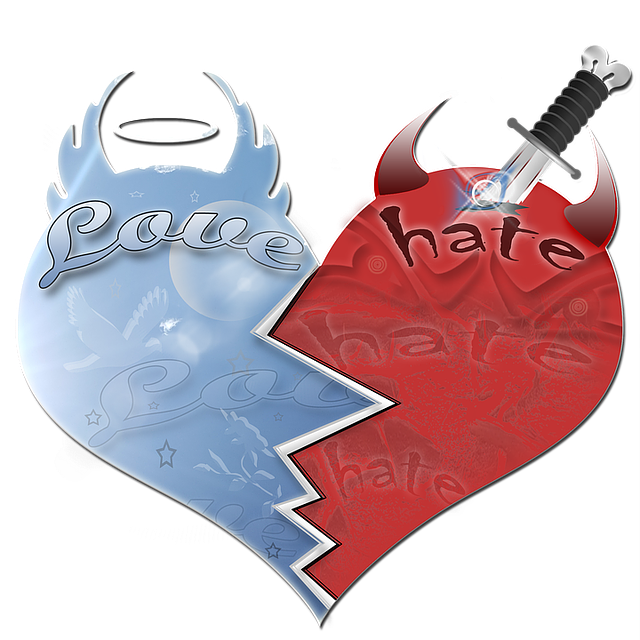Hate and rage are two intense emotions that can have negative consequences if left unchecked. While they may seem similar at first glance, there are clear differences between the two. Hate is a deep aversion or strong dislike towards someone or something, while rage is an outburst of intense anger.
What is hate?
(Image by Miguel Santiago from Pixabay )

Hate is an emotion that we all experience at some point in our lives. It can be described as a feeling of intense dislike or animosity towards someone or something. Hate is often fueled by negative experiences, personal beliefs, and biases.
Hate can manifest itself in many ways – from mild disdain to outright hostility and violence. It can be directed towards individuals, groups of people, ideas, cultures, or entire nations. The reasons for hate are complex and multifaceted but may include factors such as fear, jealousy, anger, and intolerance.
When we hate someone or something deeply, it can consume us entirely – impacting our thoughts and actions in harmful ways. Hate can lead to destructive behavior such as bullying, discrimination against others who are different from us based on their race religion sexual orientation etc., physical violence including murder.
Understanding what hate truly means is crucial if we want to avoid experiencing the negative effects associated with this strong emotion.
What is rage?
(Photo by Alessandro Bellone on Unsplash )

Rage is an intense and uncontrollable feeling of anger. It’s a strong emotion that takes over our body, mind, and soul. When we feel rage, it can be difficult to control our actions or reactions in a rational way.
At its core, rage is an emotional response to something that has triggered us – whether it’s someone cutting us off in traffic or a disagreement with a loved one. It’s often fueled by frustration and feelings of helplessness.
When we experience rage, our heart rate increases, blood pressure rises, and adrenaline surges through our bodies. We may clench our fists or grit our teeth as the intensity of this emotion takes hold.
While rage can be destructive if left unchecked, it also serves as an important signal that something isn’t right within us. It shows us where we need to set boundaries or address unresolved issues from the past.
Understanding what triggers your own personal experiences with rage is crucial for learning how to manage this powerful emotion in healthy ways.
Hate Vs. Rage – Key differences
Hate and rage are two emotions that can be easily confused, but they are actually quite different. Hate is a strong feeling of dislike towards someone or something, often resulting from anger or resentment. Rage, on the other hand, is an intense outburst of anger that usually involves physical actions such as yelling or throwing objects.
One key difference between hate and rage is their intensity. While hate may simmer below the surface for a long time, rage typically manifests quickly and explosively. Hate tends to be more sustained over time while rage occurs in short bursts.
Another difference lies in their focus. Hate is often directed towards an individual or group based on their identity or perceived characteristics such as race, religion, gender or sexual orientation. Rage can also target individuals but it’s generally not motivated by these factors.
Hate carries a sense of bitterness whereas rage carries a sense of urgency – someone who hates might avoid contact with the object of their hatred while someone who rages wants to confront the situation head-on.
Understanding these differences between hate and rage can help us better manage our emotions and reactions when we encounter them in ourselves or others.
How to deal with hate?
Dealing with hate can be a challenging task, especially when it is directed towards you. However, there are some ways that you can manage hate in a better way and avoid being consumed by its negativity.
Firstly, it’s essential to understand the cause of the hatred. Is it related to something specific that happened between you and the other person? Or is it just based on their own insecurities or biases? Understanding this will help put things into perspective.
Secondly, try to approach the situation with kindness and compassion rather than anger or defensiveness. It may not always be easy but showing empathy towards someone who hates you can sometimes disarm them and decrease their animosity.
Thirdly, set boundaries for yourself. If someone’s hatred becomes too toxic or abusive towards you, don’t hesitate to distance yourself from them. You have every right to protect your mental health and wellbeing.
Surround yourself with positivity. Focus on building connections with people who love and support you instead of dwelling on those who spread hate. Engage in activities that bring joy into your life and cultivate a positive mindset.
Remember that dealing with hate requires patience, understanding and often times forgiveness on your part. Don’t let anyone else’s negativity consume your happiness – choose love over hate every time!
How to deal with rage?
Dealing with rage is no easy feat, and it’s important to address it before it spirals out of control. Here are some tips on how to manage your anger in a healthy way:
Take a break: If you feel yourself getting worked up over something, take a step back and remove yourself from the situation. Take a few deep breaths or count backwards from 10 to calm your nerves.
Identify the root cause: Try to figure out what triggered your rage in the first place. Is there an underlying issue that needs addressing? Once you understand what’s causing your anger, you can work towards fixing it.
Practice self-care: Engage in activities that help soothe you, such as exercise or meditation. Self-care helps regulate emotions and promotes relaxation.
Seek professional help: If your rage feels unmanageable despite trying these tips, consider seeking professional support through therapy or counseling.
Remember that everyone experiences anger at some point; what matters most is how we choose to respond to those feelings. By taking proactive steps towards managing our emotions effectively, we can lead happier and healthier lives overall.
The drawbacks of hate
Hate is a strong emotion that can have serious consequences. While it may seem like an effective way to deal with difficult situations or people, hate can actually do more harm than good.
One of the biggest drawbacks of hate is that it creates negativity and toxic energy. When we hold onto hate, we are constantly focused on what we dislike about someone or something rather than focusing on positive aspects and moving forward. This negative mindset can affect our overall well-being and relationships with others.
Another drawback of hate is that it often leads to irrational and harmful behavior. People who harbor hate may act out in violent ways or engage in destructive behavior towards themselves or others. Hate speech also has the potential to cause emotional harm, discrimination, and even physical violence.
Hate also takes a toll on mental health by causing stress, anxiety, depression, and other negative emotions. It can be exhausting to constantly carry around the weight of hatred for yourself or towards others.
Holding onto hate prevents personal growth and healing from past hurtful experiences. Instead of learning from these experiences and moving forward positively through forgiveness or self-reflection; when one hates another person they become stuck in a cycle of negativity which only serves as a hurdle between themself ad their happiness
Hate only breeds more pain – internally & externally- making its drawbacks truly detrimental for both ourselves & those around us .
The drawbacks of rage
Rage is an intense and uncontrolled anger that can result in violent outbursts. While it may seem like a natural response to certain situations, there are several drawbacks associated with rage.
Firstly, when we give in to rage, we lose control of our emotions. This can lead us to make irrational decisions and say things that we regret later on. It’s important to remember that words spoken in anger cannot be unsaid.
Secondly, constant or prolonged episodes of rage can have negative effects on our physical health. Our bodies release stress hormones during times of anger which can cause muscle tension, headaches and even heart problems.
Thirdly, frequent episodes of rage can damage relationships with loved ones as well as colleagues at work. People tend not to trust someone who has difficulty controlling their temper and this could lead them to avoid interactions altogether.
Those who experience bouts of uncontrollable anger may find themselves facing legal issues if they become physically aggressive towards others or property.
It’s clear that the drawbacks associated with rage far outweigh any perceived benefits. Learning how to manage our emotions effectively is crucial for maintaining healthy relationships both personally and professionally while avoiding potential harm caused by unchecked aggression.
Featured Image By – Dmitry Vechorko on Unsplash








